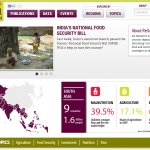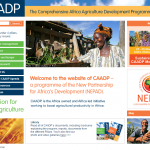Maize, millet, rice, and sorghum are the major cereal crops in West Africa, yet yields from these crops are very low compared to the world average and even other regions within Africa. A changing climate will challenge production systems already under pressure to increase output to feed a growing population.
Increasing Farmers’ Income in Nigeria (FADAMA)
In 2005, the Nigerian government launched Fadama II, a World Bank-funded project intended to increase the income of farmers, fishers, and other poor people in the low-lying floodplains—known as Fadama in the Hausa language—where poverty is concentrated.
Improving Agricultural Data and Policy Analysis in Nigeria
MOTIVATION Agriculture is the single largest contributor to the well being of the rural poor in Nigeria, sustaining approximately 86 percent of rural households in the country. Improved agricultural development and growth can provide a pathway out of poverty. In an effort to assist Nigeria’s Federal Ministry of Agriculture to meet CAADP goals and commitments, >> Read more
Providing Food Policy Information for African Policymakers: The Regional Strategic Analysis and Knowledge Support System (RESAKSS)
MOTIVATION The efforts under CAADP to promote evidence-based policy planning and implementation require a mechanism that incorporates peer review, benchmarking, and learning, as well as mutual accountability. IFPRI, along with the International Livestock Research Institute (ILRI), the International Institute of Tropical Agriculture (IITA), and the International Water Management Institute (IWMI), and in partnership with the >> Read more
The Comprehensive Africa Agriculture Development Programme: Long-Term Strategic Analysis for Improved Growth and Poverty Reduction
MOTIVATION After years of declining investment in rural development and low agricultural productivity, the African Union Commission launched the Comprehensive Africa Agriculture Development Programme (CAADP) in 2003. Participating African governments committed to allocate 10 percent of their national budgets to agriculture in order to help achieve a 6 percent annual agricultural growth rate. With USAID >> Read more
Building Ghana’s Capacity to Overcome Poverty
MOTIVATION Recognizing that agriculture is critical to Ghana’s vision of becoming a middle-income country by 2015, IFPRI, in partnership with the Ghanaian government and several development partners, launched the Ghana Strategy Support Program in 2005. The program, funded by USAID, supports the country-driven design of agriculture and rural development strategies by strengthening the skills of >> Read more
- « Previous Page
- 1
- …
- 6
- 7
- 8
- 9
- 10
- 11
- Next Page »


